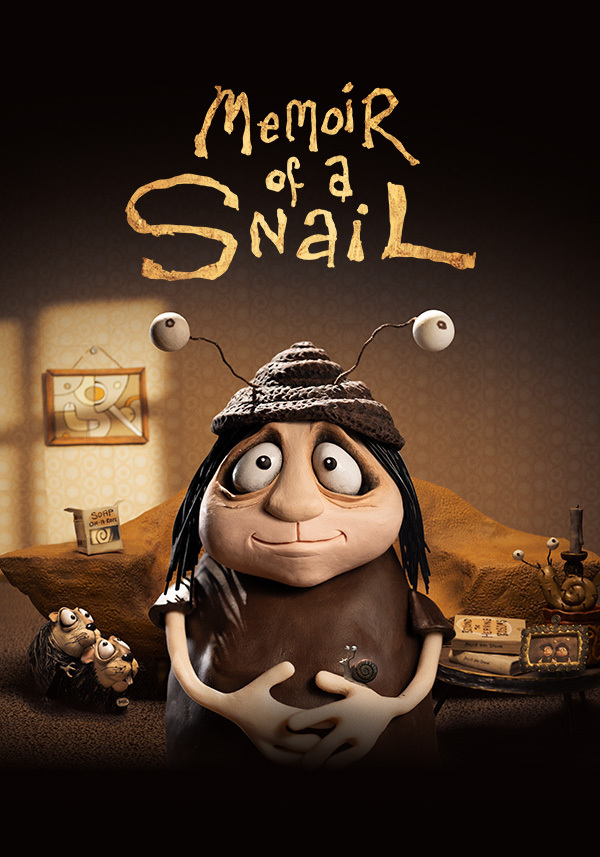Adam Elliott is famous for his stop-motion Claymation films. His short film Harvey Krumpet won an Oscar in 2003. Memoir of a Snail is his latest and only his second feature-length film, the first being Mary and Max in 2009. If you’re familiar with his work you’ll know that Elliott doesn’t go in for the kind of light-hearted whimsy that marks those delightful Aardman animations Shaun the Sheep and Wallace and Gromit.
Elliott is not kind to his characters. They may be cute but they are nearly always outcasts and misfits on whom he inflicts Job-like suffering before rescuing them from the brink of despair at the last minute with a shot of hope and good luck.
Elliott describes his work as ‘clayography’. When I first heard him say that I thought he meant cinematography done with clay. But he means a portmanteau of clay and biography. This use of ‘biography’ is interesting because Elliott’s stories and his characters often share elements of his own life story.
Grace Pudel, the heroine of Memoir of A Snail, is a lonely, anxious, obsessive misfit. This description chimes with what Elliott says about himself. Like Elliott she grew up in the suburbs of Melbourne in the 1970s, and to further extend the parallel she wants to be an animator when she grows up!
The story is narrated by the adult Grace (voiced by Sarah Snook) looking back on her life. She’s just buried one of the few true friends she ever had – a funny old lady called Pinkie (Jackie Weaver) who teaches her some important life lessons.
Grace takes us back to her earliest memories, when she lived with her beloved twin brother Gilbert (Kodi Smit McPhee) and their French father Percy, a one-time juggler who can no longer work because he was made paraplegic in a car accident. He’s a loving dad but an alcoholic. She and Gilbert are close, and he defends her at school from the bullies who tease her about her cleft lip, the result of premature birth to a mother who died in childbirth.
And this, according to Grace, was her happy childhood! Then things start to go bad….
Bullying, neglect, family break-up, death and religious zealotry are just the start of the miseries that await Grace and Gilbert. There’s suicidal ideation, poverty, obesity, alzheimers, depression, fat fetishism, fire fetishism, hoarding and squalor.
When the father dies, the twins are separated and sent to foster homes on different sides of the country. Grace is sent to Canberra where she is raised by Ian and Narelle, nice but neglectful trendies who are swingers and nudists. Gilbert is sent to a farming family of religious fundamentalists in Western Australia, who exploit and abuse him. Gilbert writes to Grace over the years, promising he will find her when he grows up. Meanwhile he develops an unhealthy fascination with fire. Grace fills her lonely isolation by raising snails and hoarding snail-shaped collectibles, a fascination she takes from her dead mother.
A recurring visual image is of eyes welling over with tears. My companion turned to me at one stage and whispered: could this get any darker? Elliott has compassion for his characters and he does see the funny side of life, but he sure puts them through the emotional wringer before delivering a happy-ish ending.
Elliott is a true auteur. He writes, produces and directs his tragicomic fables as well as hand-sculpting every little character by hand, down to the last detail of skin, hair and clothing. They are animated by moving them just a little bit and filming every frame. He has a team of animators to help with this, naturally, but there is no digital assistance or CGI. It takes absolutely ages and explains why most of his films are shorts and why his output is so limited. It’s all about quality, not quantity for Elliott.
One of the joys of the film, if not for the characters at least for us viewers, is his keen ear for the Australian vernacular. This is a quality he shares with the late Barry Humphries, who he admired immensely and who narrated Mary and Max.
Like Humphries Elliott is an acute documentarian of Australian suburbia – brand names, places, customs – and there’s lots of pleasurable (and nostalgic, for us oldies) recognition factor to be had.
Many well-known Aussie stars lend their voices here: we’ve got Eric Bana, Magda Szubanski, Paul Capsis, Nick Cave and the man of the hour Tony Armstrong. A French actor by the name of Dominique Pinon plays Percy, the father. I looked him up: he was in Delicatessen (1991) and had a bit part in Amelie (2001).
Despite the sometimes harrowing sadness there is compassion, humour and hope in Memoir of a Snail. Do go and see it. It’s ultimately uplifting and I bet it wins lots of awards. I think it’s a minor masterpiece.
*Every time I type ‘claymation’ (except this once because I persisted) the digital corporate overlord capitalises it to Claymation. This is because the word has been trademarked.
